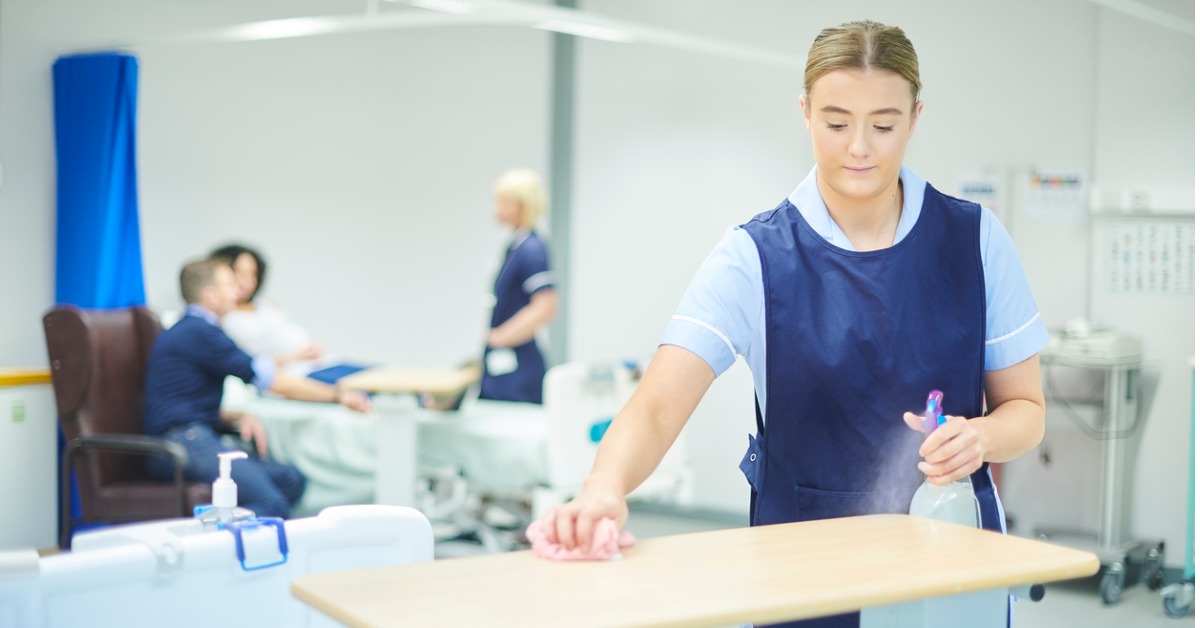
Natural versus chemical cleaning products is a contentious topic. Everyone wants a surface to be sanitised and safe, but you don’t want to compromise the health of the cleaner or the environment. Natural and chemical cleaners all have their place.
Benefits of Natural Cleaning Products
Natural cleaners are ideal for households where one or more occupants have an allergy or sensitivity to chemicals. The smell of some chemicals can irritate the eyes and respiratory system or cause a rash if they come into contact with the skin.
A natural cleaner is less likely to be harmful to the environment when it’s washed down the sink or flushed down the toilet. Our waterways are sensitive, so we should be conscious of what chemical products go down them.
Natural Cleaners
Vinegar is one of the most widely used natural cleaners because of its antimicrobial properties, which can cut through dirt, grease, and grime. Most vinegars have between four and seven percent acetic acid, but some white vinegar varieties are as high as 20% and are only suitable for cleaning, not ingesting. But just because a cleaner is natural, doesn’t mean it’s suitable for use on every surface. Vinegar shouldn’t be used to clean granite, marble, stone, cast iron products, and hardwood floors – all popular surfaces in kitchens.
Baking soda is often used with vinegar or sprinkled on a damp sponge as a multi-surface cleaner. Washing soda is another multi-purpose cleaner and is suitable as a degreaser.
Commercial Green Cleaners
Some cleaning products are labelled as ‘green’. Many consumers are willing to pay a premium for a product that is less harmful to humans and the environment. However, there is little regulation about labelling a product as green. One study found fragranced consumer cleaning products emitted more than 100 volatile organic compounds (VOCS), even some that were labelled as ‘green’, ‘natural’ or ‘organic’.
Benefits of Chemical Cleaning Products
Most natural cleaners aren’t ideal for commercial settings. High traffic locations require a heavy duty cleaner to be effective against bacteria and viruses.
Chemical cleaners are generally more efficient than natural cleaners. When you’re cleaning hundreds of surfaces in large commercial areas, you want a product that’s going to work fast to keep up with you.
Some settings require hospital-grade disinfectant cleaners. These healthcare settings include doctor and dentist surgeries, aged care centres and hospitals. Without an effective disinfectant, these locations can see an outbreak of a potentially deadly virus or bacteria which spreads to other patients, residents or visitors.
How do chemical disinfectants work at the microbial level to kill bacteria and viruses?
The efficacy of chemical disinfectants in eliminating harmful pathogens is undisputed. But how exactly do these agents work at the microscopic level to neutralise bacteria and viruses? Let's delve into the science behind it.
Targeting the Microbial Structure
At the heart of a disinfectant's power is its ability to target essential components of microbial cells. For bacteria, the cell wall is a primary target. This rigid structure provides protection and stability to the bacterium. Chemical disinfectants, such as those containing alcohols or quaternary ammonium compounds, can disrupt this cell wall, causing the bacterium to become unstable and die.
Viruses, on the other hand, are a bit more complex. They are encapsulated in a protective protein coat, often with a lipid (fatty) layer. Disinfectants designed to combat viruses typically aim to break down this protective barrier, rendering the virus inactive. For instance, alcohol-based disinfectants are particularly effective against many viruses because they dissolve the lipid membrane, leading to the disintegration of the viral particle.
Interfering with Metabolic Pathways
Another mode of action involves the disruption of a microbe's metabolic processes. By interfering with the enzymes that facilitate these processes, disinfectants can prevent the microbe from producing energy, effectively 'starving' it. Without these essential functions, the microbe cannot reproduce or carry out vital life-sustaining activities, leading to its demise.
Binding to Genetic Material
Some chemical disinfectants, like chlorine and chloramine, can penetrate the microbial cell and bind to its DNA or RNA. This binding prevents the microbe from replicating. Without the ability to reproduce, the population of the microbe quickly diminishes, curbing the spread of potential infections.
The Importance of Contact Time
It's worth noting that for a chemical disinfectant to be effective, it often needs to be in contact with the microbe for a specific duration, known as the 'contact time'. This ensures that the disinfectant has ample opportunity to act on the microbe and neutralise it.
Always refer to the product's label for recommended contact times to ensure optimal efficacy.
Safe Chemical Cleaners
Ecologically-minded consumers have demanded natural cleaning products that are kind to the environment but still work efficiently. Commercial cleaners want products that work efficiently but aren't harmful to their health. The demand has led to the development of new formulations that are effective chemical cleaners without the harmful ingredients.
Even healthcare and food preparation organisations that need to be disinfected no longer need to do a two or three step cleaning process. In the past, the only way to disinfect a surface was to clean it with a detergent then disinfect with a chlorine based product. But chlorine isn’t effective if it comes into contact with traces of detergent. After cleaning with detergent, the surface needs wiping over with clean, fresh water and dried, then the chlorine-based disinfectant applied to the detergent-free surface.
Chlor-Clean is an all-in-one hospital grade cleaner and disinfectant that reduces the cleaning time while still being effective. Chlor-Clean is supplied in tablet form. Each tablet is dissolved in a one litre bottle of water. The reduced packaging makes it a greener product than most. Cleaning staff using Chlor-Clean don’t endure the heavy chlorine smell and nasty chemicals. Hospitals around Australia are switching to Chlor-Clean as an efficient, effective cleaner.
If your organisation needs information on the effective disinfectant products for the healthcare industry, call Helix Solutions on 1300 29 32 32 or contact us online.